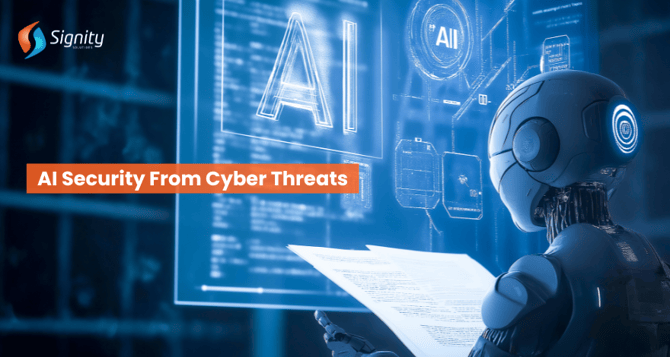AI Security: Protecting AI Systems from Emerging Cyber Threats
AI security is crucial to protect AI systems from threats like data breaches, adversarial attacks, and model theft. This blog explores the importance of AI security, key risks, and best practices to safeguard AI models. Learn how businesses can enhance protection, ensure compliance, and mitigate potential cyber threats to maintain secure AI operations.

Artificial Intelligence (AI) is changing industries by improving operations and enabling data-driven decision-making. However, as AI technology improves, it also becomes liable to attract cyber threats. Attackers can manipulate AI models or compromise training data while putting AI systems at risk.
AI security is not the same as traditional cybersecurity. It involves not just protecting networks and devices. However, it also requires ensuring that AI decisions are fair, reliable, and trustworthy.
If we don't fix the security issues in AI systems, we may see biased results, face operational problems, and risk misuse by attackers.
This blog will outline the importance of AI system security, identify key threats, and offer strategies for businesses to safeguard their AI development process from risks. Whether you're implementing custom AI solutions or integrating existing AI services, understanding these security fundamentals is essential for long-term success.
Let’s get started!
 Generate
Key Takeaways
Generating...
Generate
Key Takeaways
Generating...

-
If artificial intelligence models are not protected, they can be manipulated or accessed by others. This may result in incorrect or biased decisions with serious consequences.
-
AI systems require constant attention, which is why regular checks, updates, and assessments help identify potential risks.
-
By implementing AI security solutions and best practices, businesses can prevent hacks and ensure the safety of AI system data.
Understanding AI Security
AI security refers to protecting AI systems from cyberattacks. It protects Artificial Intelligence systems from threats like data breaches or manipulation. It uses strong security infrastructure and measures to keep sensitive data safe.
.jpg?width=3655&height=2000&name=ai-robot-using-cyber-security-protect-information-privacy%20(1).jpg)
It focuses on handling AI security risks, preventing misuse, and ensuring safety as the technology develops.
Why is AI Security Important?
Imagine a situation where your business depends on an AI system to optimize your supply chain operations.
But what if that system gets compromised?
You can even consider a customer service chatbot that is manipulated to give wrong or harmful information. In both cases, the results can range from minor problems to severe failures. This can have a significant impact on your data-driven approach and your brand's reputation.
And these are just two examples of AI usage of potential issues. There are many others. Here are some reasons why AI security matters.
Also Read: Benefits of AI Chatbots for Businesses and Customers
For Protecting Business Integrity
AI models learn from huge datasets. If these datasets are corrupted or tampered with, AI systems can produce unreliable and harmful outputs. This can lead to poor decision-making that affects varied aspects of AI capabilities like financial forecasts and product development.
By securing AI systems, you can protect the integrity of your business operations.
For Keeping Your Competitive Edge
AI gives you a competitive advantage, while secure AI systems protect your innovations. That is why keeping your algorithms and data safe from unauthorized access is essential. It stops competitors from copying your progress.
This ensures that your investment in AI helps you maintain a strong competitive edge.
To Ensure Regulatory Compliance
As more businesses leverage AI systems, there is an increasing need for rules about AI security and its ethical use. Adhering to these regulations is essential to secure systems and maintain a brand image.
By focusing on security, businesses can meet these regulations and stay ahead.
To Mitigate Operational Risks
Artificial Intelligence systems are vulnerable to various threats. This includes adversarial attacks, model inversion, and data extraction. These attacks can disrupt operations, create financial losses, and even pose safety risks.
To reduce these risks, proactive AI security is important. It helps ensure that businesses can keep running smoothly and remain strong in their operations.
For Preventing Bias and Manipulation in AI
AI systems can learn biases from the data on which they are trained. This can result in unfair or discriminatory outcomes. Some attackers may exploit these systems and make existing biases worse or even create new ones.
To address these issues, it is important to put strong security measures in place. These measures should help identify and reduce risks, while ensuring fair and ethical use of AI.
How Strong AI Security Benefits Businesses?
Strong security measures help businesses keep their AI systems safe from cyberattacks. This allows them to trust these systems to make decisions based on data. And even staying competitive in the market.
However, the benefits of AI security go beyond this. Here are some of those benefits.

- Secure AI systems work more reliably and predictably. This ensures consistent performance and accurate outcomes.
- By minimizing downtime due to potential attacks, secure AI systems help smooth operations and increase efficiency.
- Strong security measures can prevent expensive data breaches and recovery costs.
- Secure AI systems enable businesses to explore new applications and drive innovation confidently.
- Showing commitment to AI security builds trust and enhances your brand's reputation.
- AI systems handle confidential customer and business data. This makes them potential targets for cyber threats. That is where securing AI systems ensures data safety.
- Errors or attacks on AI can cause financial losses and system downtimes. Strong security measures help businesses reduce these risks.
Potential AI Security Vulnerabilities
When it comes to using AI systems, ensuring responsible use is crucial.
As it itself brings potential challenges and data security risks. If these risks of sensitive data exposure are not handled beforehand, they can lead to possible issues.

Before moving forward, take a look at some of the common attacks associated with AI systems.
Input manipulation attack
In the case of real-time input manipulation attacks, harmful or misleading data is generally inserted to modify a model's behavior or the AI system inputs.
These attacks typically affect the AI by changing the sensor readings input data, user inputs, or settings to alter the AI responses. This ultimately leads to the failure of the AI models functioning and even results in poor data-driven decisions.
Data Poisoning Attack
Data poisoning includes the insertion of harmful or misleading data into the training datasets. This corrupts the learning models while offering underperforming models only. This form of attack can exploit the capability of AI decision-making.
Adversarial Attacks
Adversarial attacks generally affect AI systems by manipulating the inputs. It introduces malicious data inputs into the AI training set that can cause the model to behave incorrectly. They can often get around security measures without being noticed.
Model Theft
Model theft introduces another vulnerability to AI systems, where attackers may reverse-engineer the AI model and reveal sensitive information.
Operational Threats
Operational failures in AI systems arise from design weaknesses and vulnerabilities. This includes security issues that attackers can exploit for unauthorized access.
If not secured properly, these systems can be targets for zero-day attacks and other advanced threats.
Security teams must be aware of these risks and emerging threats. To mitigate these vulnerabilities, it’s essential to implement best practices for improving AI system security.
Preventing Attacks Through AI Security Best Practices
Security incidents can occur when AI systems are not properly secured. It can even lead to data breaches and unauthorized access. However, by implementing some protective measures, businesses can prevent these vulnerabilities from attacking their AI systems.
Implement AI Security Standards
Using AI security standards is important to reduce risks. By following international guidelines like ISO/IEC 27001, organizations can create secure AI applications. This helps make the environment safer and lowers the risk of cyber threats.
Encrypt Model Data
Encryption makes data unreadable for anyone who does not have permission to access it. This applies to both whether the data is stored or being sent. Using strong encryption methods, you can prevent unauthorized access and protect sensitive information.
Control Access to AI Models
Controlling access to AI models can effectively prevent unauthorized access with security controls. You can improve security by using strict access controls, like role-based access control (RBAC) and multi-factor authentication (MFA). These methods verify user's identities and limit access based on their roles.
Consult with External Security Experts
Connecting with AI consulting experts can provide valuable insights and expertise. They can help you identify vulnerabilities and improve the organization's security posture. They also conduct detailed security assessments to find and fix security gaps.
Continuous Monitoring
Implement real-time monitoring of AI system activity. This approach to threat intelligence helps detect anomalies and suspicious behavior. It allows for quick responses to possible threats before they become serious.
Threat Detection Algorithms
Use advanced algorithms to identify threats aimed at AI systems. These algorithms look at user behavior patterns to find attacks and data poisoning.
Strengthen Your AI Security with Proven Best Practices
Protect your AI systems from evolving threats with industry-leading security measures. Our experts implement robust safeguards to ensure secure and reliable AI solutions.
AI Security Solutions
Even though the best practices are the security measures to prevent the AI systems from attacks, these traditional security measures are general protective measures. To get the security of the AI system at an advanced level, it is crucial to implement some AI security solutions.
Implement AI Governance
AI governance includes the steps, rules, or structure to ensure that AI systems are developed and used without any biases.
This security solution involves the setting up of ethical guidelines for all security operations.
- Managing data
- Understanding how models work
- Making decisions
It also provides a clear way to address issues related to transparency, accountability, and fairness.
AI Security Posture Management
AI Security Posture Management (AI-SPM) can help organizations see how their AI models are created, trained, and used.
It analyzes how models behave, how data moves, and how systems interact to find security and compliance risks that traditional tools might miss. With this information, organizations can apply rules and best practices to ensure their AI systems are safe and follow regulations.
Intelligent & Integrated CNAPP
A cloud-native application protection platform (CNAPP) that uses machine learning algorithms for enhanced threat detection and can ensure security in AI systems.
This platform can be integrated with AI risk modeling to evaluate possible damage. With the help of AI analytics, security teams can gain insights into the impact of a breach. They can also receive straightforward recommendations for addressing the issues effectively.
Conclusion
With the growing innovation, AI continues to impact every industry. So, maintaining its security has become a huge point of concern. Businesses are increasingly realizing the need to protect AI systems from potential threats. To address this, they need to implement workable strategies. This may include using strong security measures, working with experts, and continuously checking AI models for weaknesses.
Partnering with a reliable AI development company that focuses on AI security can also be an excellent way to handle the concern. It can help businesses create safe AI solutions. By developing secure AI models and using security strategies to reduce risks, AI experts can ensure safe, AI-driven innovations for your business.













